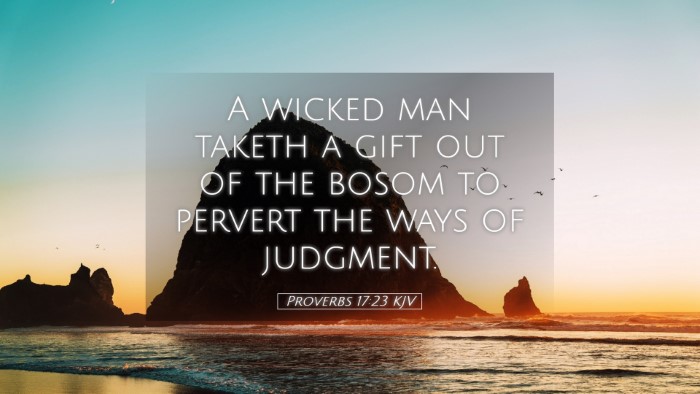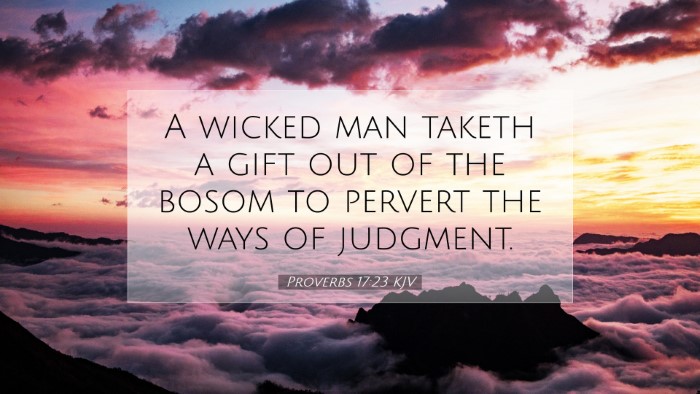Commentary on Proverbs 17:23
Verse: "A wicked man taketh a gift out of the bosom to pervert the ways of judgment."
Introduction
The book of Proverbs is a collection of wise sayings that offer insight and guidance for ethical and moral living. Proverbs 17:23 serves as a powerful reminder of the corrupting influence of bribes and the moral degradation they promote. This commentary seeks to synthesize insights from notable public domain commentaries, providing a robust analysis of the implications of this verse for pastors, students, theologians, and Bible scholars.
Contextual Background
Understanding the context of Proverbs is crucial for interpreting its verses. The book is traditionally attributed to Solomon, renowned for his wisdom. Proverbs 17 discusses the consequences of wickedness versus righteousness, emphasizing the value of integrity. In this context, the verse highlights the moral decay stemming from bribery.
Insights from Matthew Henry
Matthew Henry, in his comprehensive commentary, elaborates on the nature of a wicked man as one who is driven by self-interest. He notes that such individuals resort to bribery when they are faced with judgment. The act of receiving a gift from the bosom signifies a close and personal transaction, indicating the intimate corrupting influence that such gifts can have on the integrity of judgment.
Henry emphasizes that this practice perverts justice, likening it to a poison that taints the purity of righteous decision-making processes. He warns that those who accept bribes compromise their integrity, abandoning their moral duties in exchange for personal gain. This commentary is both a warning and a call to uphold integrity over material temptation.
Insights from Albert Barnes
Albert Barnes, in his exposition, offers a deep dive into the social implications of bribery illustrated in this verse. He points out how gifts can blind the judgment of those who are supposed to administer justice fairly. Barnes notes that accepting gifts creates a bias, leading judges and leaders away from impartiality, which is essential for societal order and justice.
Furthermore, Barnes discusses the ramifications of a society where justice is swayed by gifts, suggesting that such practices lead to societal decay. He highlights that Solomon’s warning serves as a timeless truth that resonates in any culture where corruption infiltrates the judicial system.
Insights from Adam Clarke
Adam Clarke's commentary adds another layer by examining the phrase “out of the bosom.” He explains that this signifies a hidden, intimate place where one might keep cherished items, suggesting that the acceptance of such gifts involves deep personal compromise.
Clarke further elucidates that the essence of this verse is not simply a condemnation of bribery but a broader statement about the dangers of letting material interests dictate moral and ethical behavior. He posits that it serves as a cautionary statement to both leaders and followers, stressing that integrity must be protected against the allure of wealth.
Theological Implications
This verse underscores significant theological truths related to integrity and justice within the framework of God’s moral order. The acceptance of a bribe is not merely a social faux pas; it represents a failure to uphold the divine principles that govern ethical behavior.
- Moral Responsibility: Believers are called to standardize their actions according to the righteousness of God, which calls for justice devoid of corruption.
- Spiritual Warfare: Engaging with worldly temptations, such as those represented by bribes, places individuals at odds with their spiritual commitments.
Practical Applications
For pastors and spiritual leaders, this verse provides a strong exhortation to maintain integrity in leadership roles. Here are some practical applications:
- Upholding Justice: Leaders must remain vigilant against influences that compromise their ability to make fair decisions.
- Teaching Integrity: Churches should emphasize the importance of ethical behavior in their teachings and community practices.
- Modeling Righteousness: Leaders should model transparency and accountability, fostering an environment that discourages corrupt practices.
Conclusion
Proverbs 17:23 serves as a profound reminder of the dangers of allowing materialism and corruption to influence our judgments and actions. Drawing insights from the commentary of esteemed theologians such as Matthew Henry, Albert Barnes, and Adam Clarke, we understand the weight of this warning within both individual and societal contexts. As we engage with this verse, may we commit ourselves to uphold justice and integrity in all aspects of life.


